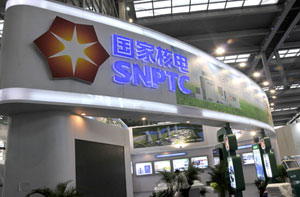'9% GDP growth' for 2011
Updated: 2011-09-29 10:39
By Chen Jia (China Daily)
|
|||||||||||
Decline predicted amid growing fears over global economic woes
BEIJING - GDP growth is predicted to remain above 9 percent this year amid growing fears over a global economic meltdown due to evolving debt crises in both Europe and the United States, a senior government think-tank economist said on Wednesday.
However, the world's second-largest economy may see declining GDP growth in the longer term, due to global conditions, said Lu Zhongyuan, deputy head of the Development Research Center of the State Council.
The economy expanded by 10.4 percent year-on-year in 2010. Its growth rate this year is likely "to be the fastest" among major world economies, although it may cool a little from previous highs, Lu said at a news conference.
"Economic fundamentals are still very strong in China, thanks to the booming demand of both investment and consumption," Lu said. China's industrial profits increased 28 percent year-on-year in the first eight months, the National Bureau of Statistics (NBS) said.
According to Lu, the slight slowdown in GDP growth results from the government's economic tightening measures targeting the real estate sector and tight monetary policies.
"The economy is experiencing a short-term moderation and growth is still within a normal range," he said.
But the rising cost of labor, land and resources is likely to gradually lead to a slowing economy in the five-year period starting 2016, with a possible average expansion rate less than 8 percent, said Lu.
Europe's sovereign debt woes and tepid global economic growth will also add uncertainty to domestic policymaking.
China's year-on-year GDP growth rate in the second quarter was 9.5 percent, slightly down from the 9.7 percent in the first three months. The NBS plans to release the third quarter's economic data on Oct 18.
The Purchasing Managers' Index (PMI), which measures manufacturing activity and provides a gauge of overall economic expansion, was estimated at 49.4 for September, falling close to its 28-month low of 49.3 in July after a short rebound last month. A figure less than 50 indicates contraction.
Weakened external demand was deemed to be a main drag on the economy, Qu Hongbin, chief economist at HSBC, said.
But trade data still showed solid export growth, and fears of a hard landing are unwarranted, according to Qu.
September consumer inflation may reach 6.4 percent year-on-year, possibly fueled by expected rising food prices during the three-day Mid-Autumn Festival holiday, Peng Wensheng, an analyst with China International Capital Corp said.
"We should also pay attention to the rapid increase of non-food prices, which can be imputed to climbing labor costs," he said. Non-food prices had increased by 3 percent in August from a year earlier.
Given that prices of vegetables and other food items are still rising, analysts forecast that September inflation will not be lower than the August figure of 6.2 percent.
Lu, from the State Council research center, said that macro-economy policies should remain to keep inflation at bay.
"If the US launches a further round of quantitative easing (QE3) this year it will strongly affect the Chinese economy in 2012. If this comes to pass, the government should react with flexible policies," Lu said.
The US Federal Reserve is widely expected to launch QE3, or at least loosen monetary policy, to boost growth.
Peng said that the US Federal Reserve is likely to launch stimulus measures soon, which may increase inflationary pressure on China by raising commodity prices and, in turn, lift the price of imports.
China International Capital Corp said in a report that the People's Bank of China, the central bank, may raise the one-year benchmark interest rate for the fourth time this year.
There is still a possibility that Europe's sovereign debt crisis could worsen. This will probably force Chinese authorities to ease credit slightly, analysts said.
CCB International Securities said in a research note that surveys of domestic commercial banks show that lending quotas will increase in the coming months.
- China expands lending to fund-hungry small firms
- '9% GDP growth' for 2011
- Self-sufficiency in ore to pass 50%
- Citic Securities raises $1.7b in HK
- Crunch comes for those with underground loans
- Mayor sorry for demolition death
- Minimum wheat purchase prices raised for '12
- China's GDP expected to grow 9% in 2011













